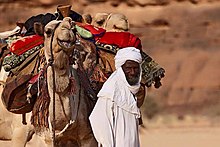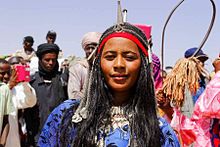Tubu
The Tubu (also Toubou , Tib (b) u , or Tebu ) are a population group in the central Sahara . They are divided into the two subgroups of the Teda and Daza , which in turn consist of numerous, often rival and sometimes hostile clans. Their languages, Tedaga and Dazaga , belong to the group of Saharan languages . Although Tedaga and Dazaga are closely related and mutually understandable, Teda and Daza do not consider themselves to be members of the same people.
History and society

The Tubu ("people of the mountains / rock people") used to settle large parts of the central Sahara in what is now Chad , Sudan , Libya and Niger . However, they were increasingly pushed back by the Arabization of North Africa and the expansion of the Tuareg . Today most of the Tubu live in the north of the Chad Basin ; The center of this settlement area is the Tibetan Mountains , which only have around 25,000 inhabitants. Approximately 350,000 people of Muslim faith, but their beliefs adapted to their habits, belong to them on a total area of 1,300,000 km². They are more like a confederation of clans than a people.
The Tubu are pastoral nomads who mainly keep goats and sheep , and camel breeding is also practiced. Donkeys are also kept as work animals and pack animals . In the past, the Tubu were often caravan drivers on the Bornus Strait between Lake Chad and Tripoli (see: Trans-Saharan trade ). In contrast to the neighboring Tuareg in the west , the Tubu have an egalitarian form of society, the position of women is stronger than in most other Islamic ethnic groups. They withstood all French attempts at colonization between 1913 and 1965.
In the conflict between Libya and Chad over the Aouzou Strip (1973-1994), the Tubu in Chad under the leadership of Goukouni Oueddei temporarily cooperated with Libya against the central government in N'Djamena , but without giving up their claim to the Aouzou Strip. In the east of the Republic of Niger, they joined forces in the 1990s to form the paramilitary organization Front démocratique pour le renouveau (FDR) to defend themselves with armed resistance against the economic and political disadvantage caused by the military regime.
In Libya, the government under Muammar al-Gaddafi pursued the Arabization of the south and, since 2007, a systematic policy aimed at denying the native Tubu citizenship rights. The number of Tubu in Fessan is estimated at 350,000 to 400,000. In the civil war of 2011 , the Libyan Tubu fought on the side of the rebels against Gaddafi's troops and the mercenaries he brought into the country from the southern neighboring states. Since mid-2011, voluntary Tubu associations have borne the brunt of the defense of Libya's southern border between Algeria, Niger and Chad. In addition to smugglers of weapons, drugs and refugees, al-Qaeda supporters are pushing into the country as the main opponents.
In February 2012, fighting broke out in Kufra between Tubu and the Arab Suwaja , in which several people died. A spokesman for Suwaja said that fighters from the neighboring countries of Chad and Sudan had been resisted. At the end of March 2012, fierce fighting broke out in Sabha between Tubu and the Arab tribe Abu Seif, killing over a hundred.
In the civil war in Libya from 2014 onwards, the Tubu split up into various militias, some of which increased their power and brought oil fields under their control. Overall, however, the Tubu were marginalized by rival warring factions.
Well-known Tubu
- Malam Maman Barka (1959–2018), musician from Niger
- Hissène Habré (* 1942), rebel leader and later President of Chad (a Daza)
- Mahamat Nouri (* 1947), rebel leader in Chad (a Daza)
- Goukouni Oueddei (* 1944), head of state of Chad from 1979 to 1982 (a Teda)
literature
- Catherine Baroin: Gens du roc et du sable. Les Toubou . Homage to Charles and Marguerite Le Coeur. CNRS, Paris 1988, ISBN 2-222-04066-3 .
- Vanni Beltrami: Tubu. Una etnìa nomade del Sahara centro-orientale . ISIAO, Rome 2007, ISBN 978-88-85320-39-0 .
- Ahmat Saleh Boudoumi: Voyages et conversation en pays toubou ... L'Harmattan, Paris 2011, ISBN 978-2-296-55909-7 .
- Jean Chapelle: Nomades noirs du Sahara. Les Toubous . L'Harmattan, Paris 1982, ISBN 2-85802-221-6 .
- Jérôme Tubiana: Contes Toubou du Sahara. Quatre-vingt-dix-neuf contes, mythes et chansons, recueillis chez les Teda, Daza, Azza et Beri du Niger et du Tchad . L'Harmattan, Paris 2007, ISBN 978-2-296-03918-6 .
Web links
Individual evidence
- ↑ a b Mirco Keilberth: The South of Libya: Boundless Freedom , in: taz.de of January 9, 2013
- ^ Libyan embassy stashed weapons in Athens in Die Presse on February 21, 2012.
- ↑ Witnesses: Tribal clashes in Libya kill scores AP on February 21, 2012.
- ^ The situation of the Tubu in and around Sabha Source: FAZ, accessed on May 22, 2013
- ↑ Libya's Fractious South and Regional Instability , Small Arms Survey, Geneva, February 2014
- ^ Understanding Libya's South Eight Years After Qaddafi , Nate Wilson; Inga Kristina Trauthig, US Institute of Peace, October 23, 2019


